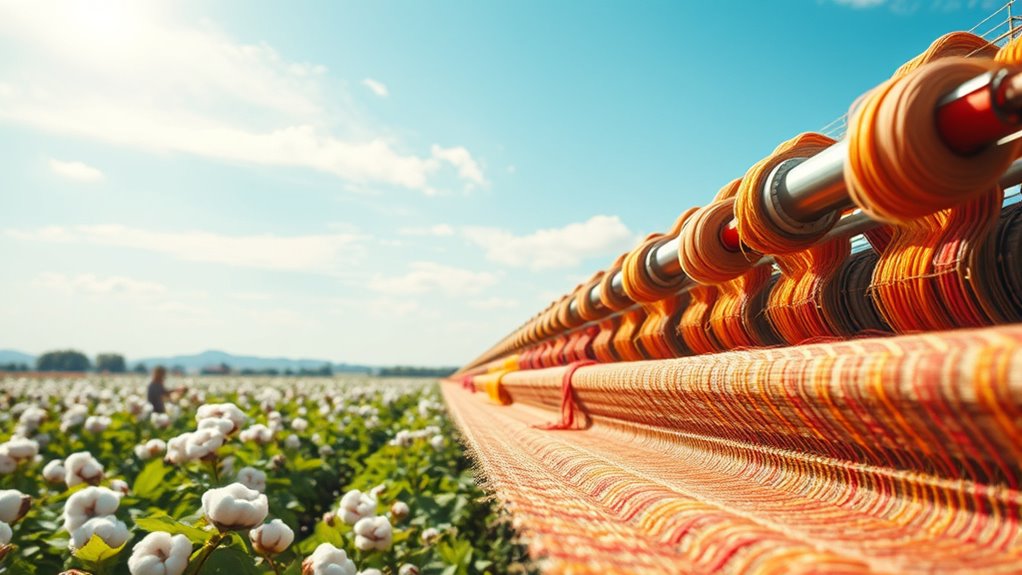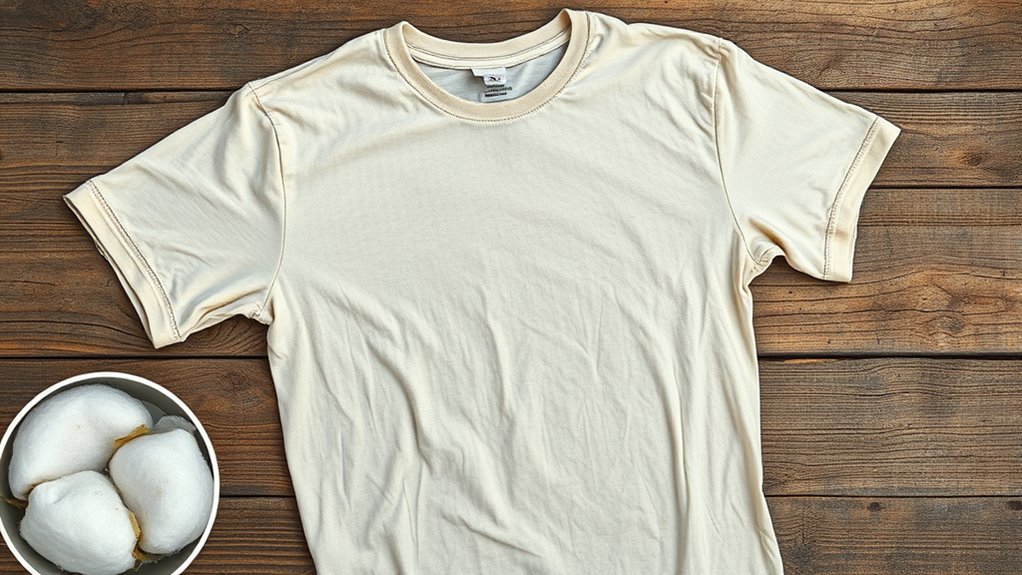When choosing a T-shirt, fabric choices directly impact its environmental footprint, durability, and ethics. Opting for sustainable materials like organic cotton reduces water use and chemical pollution, while eco-friendly manufacturing cuts energy consumption. High-quality fabrics last longer, resisting wear and tear. Supporting brands that prioritize transparency and ethical practices helps promote a more sustainable fashion industry. To understand how every step from fiber to finished garment shapes your impact, explore more about this essential process.
Key Takeaways
- Fabric sourcing impacts environmental footprint, with sustainable options like organic cotton reducing pollution and resource use.
- Manufacturing processes determine water, energy, and chemical consumption, affecting ecological health and sustainability.
- Fabric quality and durability influence a T-shirt’s longevity, reducing waste and the need for frequent replacements.
- Ethical fabric choices support fair labor practices and transparent supply chains, promoting social responsibility.
- Informed fabric selection aligns with personal values, encouraging eco-conscious purchasing and sustainable living.

A T-shirt’s journey begins long before you wear it, starting with the cotton plant’s harvest. When you pick a shirt off the rack, you might not realize how much goes into its creation, especially the choices made during its production. The fabric’s origin, whether it’s made from sustainable materials or conventional cotton, influences not only the environment but also the quality and longevity of your shirt. Sustainable materials reduce the reliance on harmful chemicals and water, making the entire process more eco-friendly. Organic cotton, for example, is grown without synthetic pesticides and fertilizers, which helps preserve soil health and supports biodiversity. Choosing fabrics made from sustainable materials means you’re supporting agricultural practices that are less damaging and more aligned with environmental conservation.
The manufacturing processes behind your T-shirt play an essential role in its overall impact. Traditional manufacturing often involves high water consumption, energy use, and chemical treatments that can pollute waterways. In contrast, more eco-conscious manufacturing processes aim to minimize these impacts by utilizing advanced techniques like waterless dyeing, energy-efficient machinery, and recycled materials. These methods not only reduce the ecological footprint but also tend to produce higher-quality garments that last longer. When manufacturers prioritize sustainable practices, they often ensure fair labor conditions and transparency throughout the supply chain, which adds ethical value to your purchase.
Your choice of fabric and the way it’s processed can also influence how your T-shirt ages. Eco-friendly manufacturing processes tend to produce softer, more durable fabrics that resist wear and tear better over time. This means your shirt won’t just be better for the planet; it’ll also stay looking good longer, reducing the need for frequent replacements. By paying attention to these details—opting for brands that prioritize sustainable materials and transparent manufacturing—you’re making a statement about your values and reducing your environmental footprint.
Ultimately, the fabric choices and manufacturing processes behind your T-shirt are more than just technical details—they’re a reflection of the kind of world you want to support. When you understand how sustainable materials and responsible manufacturing impact the environment, you can make more informed decisions on what to buy. Your T-shirt isn’t just a piece of clothing; it’s a product of countless choices that can promote sustainability and ethical practices. So, next time you pick out a shirt, consider the journey it’s been on and choose one made with care for the planet and its people. Understanding energy efficiency can also help you make choices that support sustainable living in other areas of your life.
Frequently Asked Questions
How Does Fabric Choice Affect T-Shirt Recyclability?
Your fabric choice directly impacts a T-shirt’s recyclability. Natural fibers like cotton are easier to recycle and biodegrade, supporting fiber recycling and reducing waste. Synthetic fabrics like polyester are harder to recycle and may not biodegrade, leading to environmental issues. Choosing eco-friendly fabrics helps guarantee your T-shirt can be reused or broken down naturally, minimizing its footprint and promoting sustainable fashion practices.
Are Organic Fabrics Always More Sustainable Than Synthetic Ones?
You might think organic fabrics are always greener, but the reality is more complex. When comparing organic vs. synthetic, consider the entire fabric lifecycle. Organic fabrics often have lower chemical impacts and biodegrade faster, but may require more water or land. Synthetic fabrics can be durable and recycled, yet their production and disposal pose environmental challenges. Ultimately, sustainability depends on the full lifecycle, not just the fabric type.
What Are the Environmental Impacts of Dyeing T-Shirts?
You might not realize that dyeing processes can profoundly impact the environment. When you dye a T-shirt, chemicals are often used, and improper handling can lead to chemical runoff into water sources. This runoff harms aquatic life and pollutes ecosystems. Choosing eco-friendly dyes and supporting brands that use sustainable dyeing methods helps reduce chemical waste and minimizes environmental damage, making your T-shirt more eco-conscious.
How Can Consumers Identify Eco-Friendly Fabric Options?
Did you know that only 20% of textiles are certified as eco-friendly? To spot eco-friendly fabrics, look for certifications like GOTS or OEKO-TEX, which ensure sustainable practices. Check for eco labels on clothing tags or packaging, and research brands’ commitments to eco certifications. These indicators help you make conscious choices, supporting environmentally responsible fabric options and reducing your fashion footprint.
Do Different Fabrics Have Varying Durability During Washing?
Different fabrics definitely vary in durability during washing. You might notice some fabrics experience more fabric shrinkage or color fading after multiple washes. Natural fibers like cotton can shrink if not cared for properly, while synthetic fabrics like polyester usually resist shrinkage and fading better. To keep your T-shirt looking its best, always follow the care instructions and wash on gentle cycles, especially for delicate or natural fabrics.
Conclusion
Understanding the life cycle of a T‑shirt shows why fabric choices matter. Did you know that producing a single cotton T‑shirt requires about 2,700 liters of water? By choosing sustainable fabrics, you can reduce environmental impact and support ethical practices. Every shirt you buy or wear has a footprint—so next time, pick eco-friendly options. Small choices make a big difference in protecting our planet and ensuring a better future for everyone.









